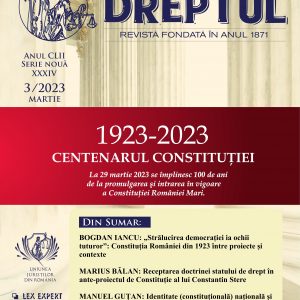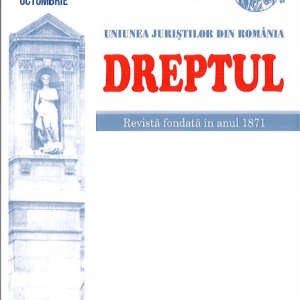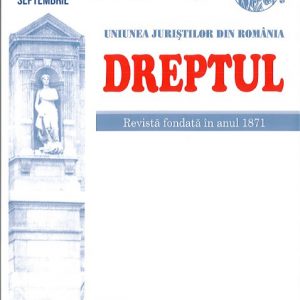-
 Cauza nr. 2205/16, Keskin c. Olandei. Hotărârea din data de 19 ianuarie 2021 Cauza privește imposibilitatea reclamantului de a interoga, în calitate de acuzat într-un dosar privind infracțiunea de înșelăciune, martorii ale căror declarații, consemnate într-un raport al poliției, au fost utilizate ca probe pentru condamnarea sa.
Cauza nr. 2205/16, Keskin c. Olandei. Hotărârea din data de 19 ianuarie 2021 Cauza privește imposibilitatea reclamantului de a interoga, în calitate de acuzat într-un dosar privind infracțiunea de înșelăciune, martorii ale căror declarații, consemnate într-un raport al poliției, au fost utilizate ca probe pentru condamnarea sa. -

-

-
 This paper is the first part of a more extensive commentary on Article 5 of the European Convention on Human Rights, which will be entirely published in three consecutive issues of this law journal. The present work assesses the general features of the right to liberty and security as they emerge from the relevant case-law of the European Court on Human Rights. On this occasion, it underlines the purpose of this right, namely the protection of the individual from arbitrariness, and it analyses the general conditions for deprivation of liberty. It also goes on to evaluate the first two such situations of authorised deprivation of liberty enshrined in Article 5 § 1 a) and b) of the Convention.
This paper is the first part of a more extensive commentary on Article 5 of the European Convention on Human Rights, which will be entirely published in three consecutive issues of this law journal. The present work assesses the general features of the right to liberty and security as they emerge from the relevant case-law of the European Court on Human Rights. On this occasion, it underlines the purpose of this right, namely the protection of the individual from arbitrariness, and it analyses the general conditions for deprivation of liberty. It also goes on to evaluate the first two such situations of authorised deprivation of liberty enshrined in Article 5 § 1 a) and b) of the Convention. -
 This study represents, in its essence, a micro-monograph regarding the right to image, a component of personality rights. In this respect, following a presentation regarding the “personality rights, in general”, the authors examine in detail the issue of the right to image (notion, basis, autonomy of the right to image, consent to the reproduction of one’s image, limits of the right to image, image contract, extinguishment of the right over image).
This study represents, in its essence, a micro-monograph regarding the right to image, a component of personality rights. In this respect, following a presentation regarding the “personality rights, in general”, the authors examine in detail the issue of the right to image (notion, basis, autonomy of the right to image, consent to the reproduction of one’s image, limits of the right to image, image contract, extinguishment of the right over image). -
 Cauza Roman Zakharov contra Rusiei, Cererea n° 47143/06, Hotărârea Marii Camere din 4 decembrie 20151
Cauza Roman Zakharov contra Rusiei, Cererea n° 47143/06, Hotărârea Marii Camere din 4 decembrie 20151 -
 Cauza Societatea Profesională Notarială „Etica” împotriva României, Cererea nr. 43190/10, Curtea Europeană a Drepturilor Omului (Secția a patra), Hotărârea din 24 iulie 20181 . La originea cauzei se află cererea din 17 iunie 2010 formulată de Societatea Profesională Notarială „Etica”, persoană juridică română, contra României, în temeiul art. 34 din Convenția pentru apărarea drepturilor omului și a libertăților fundamentale („Convenția”).
Cauza Societatea Profesională Notarială „Etica” împotriva României, Cererea nr. 43190/10, Curtea Europeană a Drepturilor Omului (Secția a patra), Hotărârea din 24 iulie 20181 . La originea cauzei se află cererea din 17 iunie 2010 formulată de Societatea Profesională Notarială „Etica”, persoană juridică română, contra României, în temeiul art. 34 din Convenția pentru apărarea drepturilor omului și a libertăților fundamentale („Convenția”). -
 In this study, the author makes an analysis on the right to life, with emphasis on the moment when the right to life begins to flow, including from the phase of conception of human life, by reference to the case law of the European Court of Human Rights and of other courts outside the European Union, following that, in the final part of the study, an analysis be made on the current criminal provisions protecting the right to life in its incipient phase and the compliance of these provisions with the standard required by the Convention.
In this study, the author makes an analysis on the right to life, with emphasis on the moment when the right to life begins to flow, including from the phase of conception of human life, by reference to the case law of the European Court of Human Rights and of other courts outside the European Union, following that, in the final part of the study, an analysis be made on the current criminal provisions protecting the right to life in its incipient phase and the compliance of these provisions with the standard required by the Convention. -
 To say that man is the supreme value of a democratic society and of the state of law is a partly true statement. This is because it is known that, in the long period in which the principles of the constitutional democracy and of the state of law have been affirmed in the social practice, no human society succeeded in fully providing the individual with the full extent of its political, social, economic, cultural or religious value. Even in the states considered, without reservations, to be democratic there have been and still are threats to the physical and mental integrity of the individual from some state authorities and even indifference for the individual’s life. In fact, this actually explains that the constitutional utterances according to which „the right to life is guaranteed”, „the dignity and the personality of the individual are supreme values”. The existence of a rule of law and, more so, of a rule of constitutional rank, which affirms and enshrines in normative models the importance of man as supreme value of a socio-political community, proves that the compliance with this value still remains a standard, a requirement imposed on everybody as model of social behaviour.
To say that man is the supreme value of a democratic society and of the state of law is a partly true statement. This is because it is known that, in the long period in which the principles of the constitutional democracy and of the state of law have been affirmed in the social practice, no human society succeeded in fully providing the individual with the full extent of its political, social, economic, cultural or religious value. Even in the states considered, without reservations, to be democratic there have been and still are threats to the physical and mental integrity of the individual from some state authorities and even indifference for the individual’s life. In fact, this actually explains that the constitutional utterances according to which „the right to life is guaranteed”, „the dignity and the personality of the individual are supreme values”. The existence of a rule of law and, more so, of a rule of constitutional rank, which affirms and enshrines in normative models the importance of man as supreme value of a socio-political community, proves that the compliance with this value still remains a standard, a requirement imposed on everybody as model of social behaviour. -
 Dreptul de trecere, reglementat de art. 616–619 din vechiul C.civ., trebuie înțeles sub trei ipostaze: aceea a dreptului de a cere recunoașterea servituții de trecere, ipostaza exercitării servituții legale de trecere și ipostaza dreptului de a cere modificarea servituții legale de trecere. Legat de dreptul de a cere recunoașterea servituții de trecere, acesta este considerat ca având un caracter potestativ, constituind o simplă facultate pentru proprietarul locului înfundat. Prin urmare, atunci când un imobil devine loc înfundat, proprietarul său poate reclama, prin manifestarea sa unilaterală de voință, să îi fie stabilită o servitute legală de trecere. Caracterul potestativ al dreptului rezultă cu claritate din formularea „poate reclama” din art. 616 din vechiul C.civ. (Curtea de Apel Craiova, Secția civilă, Decizia nr. 739 din 9 iulie 2019, www.rolii.ro)
Dreptul de trecere, reglementat de art. 616–619 din vechiul C.civ., trebuie înțeles sub trei ipostaze: aceea a dreptului de a cere recunoașterea servituții de trecere, ipostaza exercitării servituții legale de trecere și ipostaza dreptului de a cere modificarea servituții legale de trecere. Legat de dreptul de a cere recunoașterea servituții de trecere, acesta este considerat ca având un caracter potestativ, constituind o simplă facultate pentru proprietarul locului înfundat. Prin urmare, atunci când un imobil devine loc înfundat, proprietarul său poate reclama, prin manifestarea sa unilaterală de voință, să îi fie stabilită o servitute legală de trecere. Caracterul potestativ al dreptului rezultă cu claritate din formularea „poate reclama” din art. 616 din vechiul C.civ. (Curtea de Apel Craiova, Secția civilă, Decizia nr. 739 din 9 iulie 2019, www.rolii.ro) -

-
 This paper appears as a response to the debate created by the new proposals to amend the criminal codes. I believe that a legal debate should start from the fundamental principles of law and be conducted academically, presenting legal arguments and also knowing the comparative law issues related to the topic debated. This is why this paper offers a historical, current and comparative perspective in terms of recognizing the right to silence to the person being heard as a witness in the criminal trial.
This paper appears as a response to the debate created by the new proposals to amend the criminal codes. I believe that a legal debate should start from the fundamental principles of law and be conducted academically, presenting legal arguments and also knowing the comparative law issues related to the topic debated. This is why this paper offers a historical, current and comparative perspective in terms of recognizing the right to silence to the person being heard as a witness in the criminal trial.
